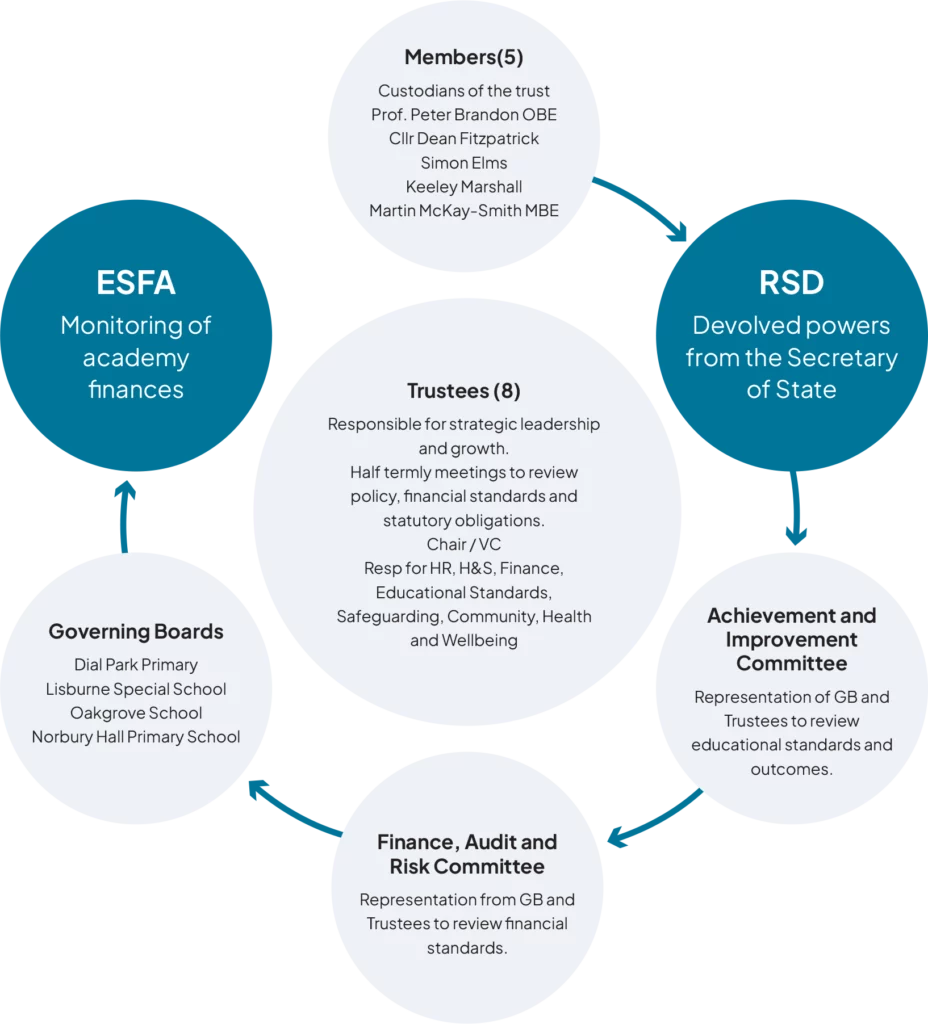Our Governance Structure
Four Rivers Family of Schools model of governance combines the Members and Trust Board with Local Governing Boards in each of the schools within the Trust.

Trust Board – Roles and Responsibilities
Four Rivers Family of Schools believes that we already have a diverse set of skills within out current Governing Boards and want to grow our trust with a board who have the expertise and knowledge of our schools, understand the challenges and the aspirations of our communities and have the wider expertise and skillset to provide professional challenge and expect the very best of standards and outcomes for our partnership.
Governors already working within our schools have been invited to express an interest in the roles. We plan to recruit to the positions first from within and then recruit wider if necessary.
The Trustee Roles are not open to Parent Governors as we plan to maintain Parent Governor representation on the School Governing Boards.
Four Rivers Trust Board will perform three core functions:
Ensuring clarity of the vision, ethos and strategic direction.
Holding the Executive Leaders to account for the educational performance of the schools and its pupils and the effective and efficient performance management of staff.
Overseeing the financial performance of the schools and making sure that its money is well spent.
Taken from the DfE Academy Trust Governance – Structures and Role Descriptors Guidance.
Trustees must be committed to understanding and accepting the 7 Principles of public life by Lord Nolan.
1. The Seven Principles of Public Life
The Seven Principles of Public Life (also known as the Nolan Principles) apply to anyone who works as a public office-holder. This includes all those who are elected or appointed to public office, nationally and locally, and all people appointed to work in the Civil Service, local government, the police, courts and probation services, non-departmental public bodies (NDPBs), and in the health, education, social and care services. All public office-holders are both servants of the public and stewards of public resources. The principles also apply to all those in other sectors delivering public services.
1.1 Selflessness
Holders of public office should act solely in terms of the public interest.
1.2 Integrity
Holders of public office must avoid placing themselves under any obligation to people or organisations that might try inappropriately to influence them in their work. They should not act or take decisions in order to gain financial or other material benefits for themselves, their family, or their friends. They must declare and resolve any interests and relationships.
1.3 Objectivity
Holders of public office must act and take decisions impartially, fairly and on merit, using the best evidence and without discrimination or bias.
1.4 Accountability
Holders of public office are accountable to the public for their decisions and actions and must submit themselves to the scrutiny necessary to ensure this.
1.5 Openness
Holders of public office should act and take decisions in an open and transparent manner. Information should not be withheld from the public unless there are clear and lawful reasons for so doing.
1.6 Honesty
Holders of public office should be truthful.
1.7 Leadership
Holders of public office should exhibit these principles in their own behaviour and treat others with respect. They should actively promote and robustly support the principles and challenge poor behaviour wherever it occurs.
